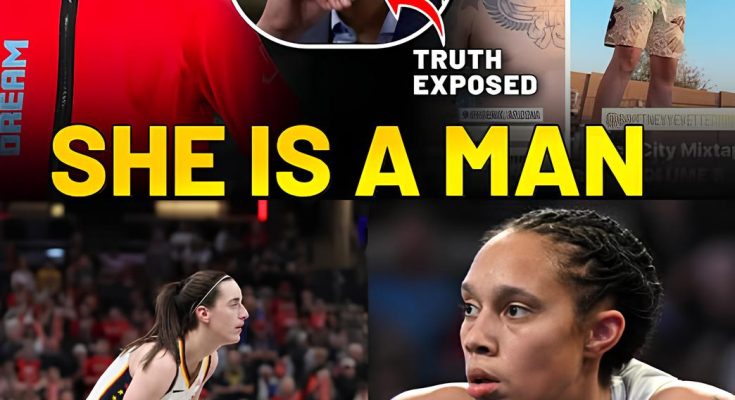Brittney Griner Faces Backlash Over Gender Identity Rumors Amid Caitlin Clark Controversy
Brittney Griner is once again at the center of a storm, but this time, it’s far from the typical sports controversy. A leaked video has reignited a heated public debate about the WNBA star’s gender identity, coinciding with her recent clash with rising sensation Caitlin Clark. The incident has set social media ablaze, with reactions flooding in from fans, commentators, and even fellow athletes. As the lines between personal privacy, competitive fairness, and public scrutiny blur, this story is pushing the conversation around transgender athletes and gender verification in sports into uncharted territory.

The chaos began after a clip went viral showing Griner mouthing what appeared to be derogatory comments following a foul involving Clark. Lip readers couldn’t agree on the exact words—some heard “trash,” others claimed she said “white girl.” Either way, the footage stirred outrage online. Former NCAA swimmer Riley Gaines amplified the controversy by suggesting Griner used a racial slur directed at Clark.
What truly surprised many wasn’t just the content of the video—but Griner’s silence. At a time when public figures often rush to clarify such claims, the WNBA star has remained quiet, which only fanned the flames of speculation. Even popular sports analyst Skip Bayless weighed in, criticizing the league’s apparent reluctance to address the situation directly.
But things escalated further when an old topless clip of Griner—reportedly from her own Instagram—resurfaced. Viewers noted that Instagram’s automatic filters, which typically flag nudity in female accounts, hadn’t removed the post. It remained online for over 100 weeks without issue. This led to speculation that the platform’s AI had categorized her as male, further fueling rumors.
The conversation quickly shifted from trash talk to full-blown debates about Griner’s eligibility to compete in women’s sports. Various theories began circulating—some suggesting she might be a biological male, others proposing that she could be intersex or undergoing testosterone therapy. Regardless of the truth, the implications for fairness in women’s sports are significant.
At the heart of the debate is a crucial question: should the WNBA and other professional women’s leagues implement more transparent gender verification standards? While privacy and dignity must always be respected, critics argue that failing to address biological advantages—especially when there’s evidence suggesting a possible competitive edge—can undermine the integrity of women’s athletics.

It’s worth noting that the WNBA has never publicly questioned Griner’s eligibility. She has competed professionally for years, represented Team USA, and even became a political symbol after her high-profile release from Russian detention in exchange for arms dealer Viktor Bout—a deal that drew both praise and criticism. Some questioned whether such a trade would have been made for a less prominent, less “diverse” athlete.
Now, with Caitlin Clark’s unprecedented rise—sparking record-breaking jersey sales, skyrocketing viewership numbers, and rising ticket prices—the dynamics in the WNBA are shifting. Clark represents the new generation: marketable, widely embraced by both casual and hardcore fans, and increasingly positioned as the face of the league. Her growing influence has unintentionally put more pressure on veteran players like Griner, especially in moments of public tension.
These layered controversies—race, gender, celebrity, and fairness—are playing out in real-time, with millions of viewers tuning in not just for the basketball, but for the drama unfolding off the court.
For now, Griner has yet to respond directly to the leaked footage or the swirling rumors about her gender identity. But the situation highlights a deeper issue: the need for sports organizations to establish clear, science-based policies that balance inclusion with competitive equity. As women’s sports continue to grow in popularity and profitability, these issues are no longer fringe—they’re front and center.
Whether or not the WNBA addresses this particular case, it’s clear that the conversation about biology, gender, and fairness in sports is far from over.



